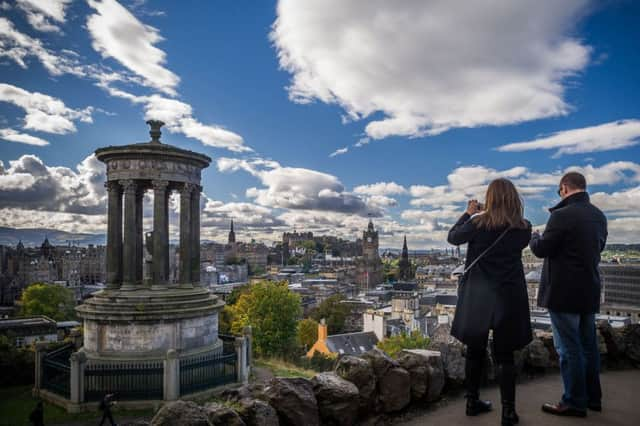A history of the Edinburgh accent
This article contains affiliate links. We may earn a small commission on items purchased through this article, but that does not affect our editorial judgement.


Accents and dialect are actually very different. An accent is how you sound when you talk - dialect is the words you use.
The most contemporary people quoted on the Edinburgh dialect is authors like Irving Welsh and Ian Rankin.
Advertisement
Hide AdAdvertisement
Hide AdThe Edinburgh dialect is the longest standing dialects, and one of the six versions of Scots. The region of the Edinburgh dialect also extends to Fife and the Lothians, stopping at Falkirk, where there is a noticeable change in words, from using “bairn” and “yin” on the east coast, to “wains” and “wan” on the west.
In upper-crust areas such as Stockbridge and Morningside, residents pride themselves on their flawless diction and restrained vocabulary. While the more refined areas of Edinburgh channel the spirit of Miss Jean Brodie, it’s the likes of Leith and Tollcross that offer the more interesting slang.
Like all of the urban dialects, ‘Embra’ suffers from a loss of Scots vocabulary. The pronunciation of Edinburgh Scots could be called the South East Central Scots.
The Scots Language Centre wrote on their website: “East Central speakers split the sound in words like mune, dune, fluir, spune, use, abune and puir into two groups according to whether the vowel is long or short, giving min, din, spin, yiss and abin, but flair, yaise and pair.”
Michael Hance, director of the Scots Language Centre, said: “Edinburgh forms one of Scotland’s most diverse speech communities where you can hear a range of accents and dialects. Scots has been spoken in the city for hundreds of years and was used in the court and Parliament prior to the Union of Crowns in 1603 and Union of Parliaments in 1707.
“Robert Louis Stevenson, one of Edinburgh’s most famous sons used the Edinburgh form of Scots, along with English, in his poetry and prose, a tradition carried on into contemporary times by writers like Irvine Welsh.
“The city’s nickname - Auld Reekie - which means ‘old smokey’ is rendered in the local dialect and many street and place names in the city have Scots origin. Gladstone’s Land for example comes from the Scots word ‘gled’ meaning a bird of prey while Maiden Craig was originally Midden Craig signifying its role as a local dump.
Advertisement
Hide AdAdvertisement
Hide Ad“The many ‘gates’ in the city share a style of naming with neighbouring languages like Norwegian and Swedish. Speakers of Norwegian for example, would easily recognise the name Kirkgate. This way of naming streets is found throughout Scotland and indicates our common linguistic heritage with our neighbours across the North Sea.
“Scots is still to be heard throughout Edinburgh and even those who don’t think of themselves as Scots speakers often have a passive knowledge of the language. Nearly everyone will know words like ‘bairn’ and ‘greet’ and you can see Scots used in the names of businesses like ‘Piece Box’, a chain of Edinburgh based sandwich shops.
“This form of speech is most closely associated with the city’s Morningside district - in Spark’s novel Brodie lived in Churchill - and is believed to originate from the period when the aspirational bourgeois attempted to mimic English forms of speech in order to signify their economic and cultural success.
“In order to rid themselves of ‘Scotticisms’ the Edinburgh middle class sought the aid of elocution teachers. In the days before people were exposed to English forms of English through radio and TV, those wishing to sound less Scottish relied on these elocution lessons to change their speech.
“Some of what emerged wasn’t entirely English in sound and the famous Morningside ‘extent’ developed as a result. It can still be heard today in charity shops the length of Morningside Road.
“Edinburgh is possibly one of Scotland’s most interesting cities linguistically. As the birthplace of Scots, it retains even today a large Scots speaking population; in the 2011 census thousands of respondents in Edinburgh said they could speak Scots.
“As well as Scots, Edinburgh has its own form of Standard English, its particular accent having become a cliché of ‘perjink’ speech.
Advertisement
Hide AdAdvertisement
Hide Ad“In recent times Edinburgh has welcomed many new speech communities with immigration from Eastern Europe being particularly notable. Nearly everyone in Edinburgh will have encountered a Pole with a local accent.
“Our capital city’s diverse range of voices is something to celebrate and we must hope that our distinct local dialect of Scots which is such an important part of our heritage survives well into the future.”
Find out more about different regions from the Scots Language Centre or on their Facebook
An Edinburgh glossary
Embra - Edinburgh
Baffies - slippers
Barry - fantastic or great
Bunker - worktop, kitchen counter
Chum - join on a journey (Chumming a friend doon the road)
Cludgie - toilet
Deek - look at
Dinnae - don’t
Feart - afraid of
Foostie - stale
Radge - crazy or uncontrollable (A person can either be a radge, or ‘go radge’)
Reeking - drunk
Scoobied - clueless (Scooby Doo is rhyming slang for clue)
Shan - a shame, or disappointing (A bad day at work could be ‘well shan’)
